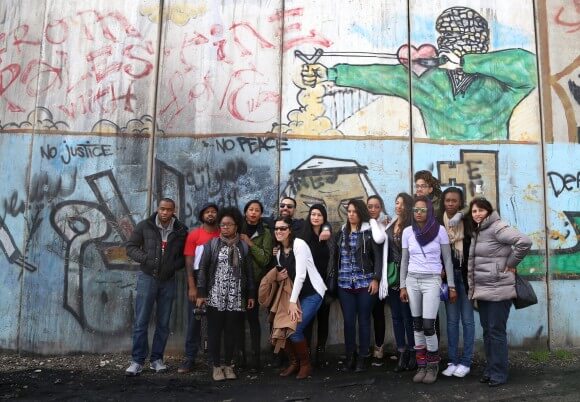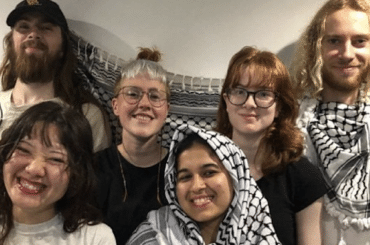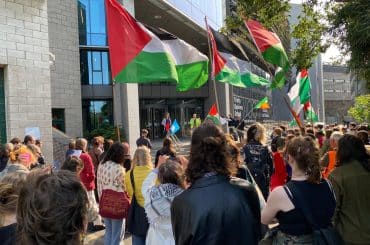After Black teen Trayvon Martin’s 2012 death at the hands of George Zimmerman in Florida, a newly formed group called the Dream Defenders sprung into action. They marched for miles. They occupied the state capitol in Tallahassee. They pushed for legislative measures that would address racial inequality.
Today, the Dream Defenders remain focused on racism in America, and have helped lead the burgeoning #BlackLivesMatter demonstrations that have swept the nation after the deaths of Michael Brown and Eric Garner, two unarmed Black men killed by the police in Ferguson, Missouri and New York City.
But the Dream Defenders have also broadened their focus in recent months by joining U.S. Palestinian rights groups in calling for an end to Israeli human rights abuses. On December 20th, they deepened their commitment to Palestinian rights by unanimously endorsing the boycott, divestment, and sanctions (BDS) call. The endorsement came during the Dream Defenders’ conference in Florida.
And at the start of 2015, members of Dream Defenders, along with other groups focused on racial injustice like the Black Youth Project, went on a delegation to Palestine organized by the Institute for Middle East Understanding. The trip was meant to expose Black activists to the Israeli occupation. After returning, the participants have drawn parallels between the Black and Latino experience in the U.S. and the Palestinian experience.
The BDS endorsement by the Black and Brown-led Dream Defenders and the trip to Palestine is a sign of the growing ties between the racial justice movement and Palestinian rights activists. The groups are building on a rich history of collaboration between Black, Latino and Palestinian activists.
The growing ties between the #BlackLivesMatter movement and Palestine also comes at a time when pro-Israel groups, anxious about a changing America, are courting communities of color to bolster America’s pro-Israel stance.
“It was really great to participate in a space where people immediately understood why Palestine is such an important issue and started making connections to their own histories of experiencing racism or colonialism in the Caribbean or Latin America or Africa,” said Kristian Davis Bailey, who was part of the Students for Justice in Palestine (SJP) contingent at the Dream Defenders conference.
The BDS endorsement by the Dream Defenders was the result of several months of conversation between SJP and the Florida group. SJP members reached out to the Dream Defenders after reading that the Florida organization was getting involved in Palestine solidarity work. Both groups attended each other’s conferences, laying the groundwork for what has become a multiracial alliance in the struggle for racial justice and Palestinian rights. Members of the Dream Defenders, who have worked with SJPs on campus, could step up their work on BDS campaigns in the future. And members of both organizations point to companies like G4S, which operates prisons in the U.S. and in Palestine, as one example of why they see their movements as common struggles.
The January trip to Palestine fortified the links between Black, Brown and Palestinian activists, said Ahmad Abuznaid, a Palestinian-American who is a co-founder of the Dream Defenders.
“This trip, for me, and for the Dream Defenders, for Black Lives Matter, and all the folks who were involved, was a declaration that, you know what, the relationships are being revisited and we’re going to fortify them and take them to the next level,” Abuznaid told me over the phone while he attended a protest in Florida against the North Miami Beach Police Department’s use of photos of Black convicts for a sniper training program. “So Black youth, Palestinian youth, LGBTQ youth, we’re united, we’re united and we’re building, and that’s going to make a lot of people very nervous.”
Tara Thompson, a St. Louis-based activist who has participated in Ferguson protests since August, when Michael Brown was killed, was one of the delegates. Asked if she saw any parallels between Black Americans and Palestinians, she ticked off a number of examples, like being harassed at Ben-Gurion Airport and at airports in the U.S.
“It might not look the same,” she said in an interview. “But there are certain neighborhoods [in the U.S.] that you definitely don’t want to drive in because you’re harassed, targeted. You know, ‘driver’s license and registration’ is the same as having to show whatever you have to show at a checkpoint.”

In recent months, as more and more activists like Thompson have drawn parallels between Palestine and racial injustice in the U.S., pro-Israel organizations have forcefully come out against making those comparisons. The Anti Defamation League’s Deputy National Director Kenneth Jacobson recently wrote in the Op-Ed “Don’t Compare Ferguson and Palestine“:
The latest strategy being used by those who make a career of assaulting the good name of the State of Israel is to link the issue of full equality for African-Americans, as symbolized by the word “Ferguson,” with the Israeli-Palestinian conflict.
There is a long history of using legitimate American social justice issues to undermine the Jewish state. We saw it during the Vietnam War, where small contingents linked opposition to the war to opposition to Israel. We saw it in protests against the war in Iraq, which some linked to Israeli policy toward the Palestinians. We saw it during the Occupy Wall Street movement, when some targeted Israel as well as the financial system.
There is, however, no rational connection between the challenge of racism in America and the situation facing the Palestinians.
Delegates returning from Palestine would surely disagree. Aja Monet, a prominent New York City-based poet who went on the trip, told me the delegates were detained and interrogated for two hours by Israeli security officials on their way back to the U.S.
“At the end of the day, we were still Black. You know, we were Black enough to be stopped at the airport, and interrogated for two hours. Something about our Blackness was threatening enough for you to stop us, and for you to interrogate, and for you to ask us where we ate, and how we ate, and where we spent our money, what we did while we there, what pictures we had,” she said. “That’s like being an everyday Black kid in America. Every day, you walk with the stigma of fear and interrogation around your existence. And I think we were able to relate to that, being in Palestine, and witnessing the type of atmosphere that was created by the Israeli occupation.”
Black engagement with Israel/Palestine has a complex history. There is a long tradition of Black American affinity for Zionism. Some of the leading Black thinkers in the early to mid twentieth century, from Marcus Garvey to W.E.B. Du Bois, admired Zionist leaders, seeing them as advocates for a long persecuted people. Garvey famously advocated for all Black Americans to move back to Africa–advocacy that mirrored Zionist ideology. In the 1940s, Black intellectuals advocated for the state of Israel, seeing it as anti-colonial struggle against Arab aggressors, as the scholar Robin D.G. Kelley wrote in a chapter for the e-book Apartheid Israel: The Politics of an Analogy.
The Black left changed its tune, though, beginning in 1956, when Israel, Britain and France colluded to invade Egypt after Gamel Abdel-Nasser nationalized the Suez Canal. 1967 was another turning point. When Israel captured the West Bank, Gaza and Jerusalem, Black activists, like those in the Student Nonviolent Coordinating Committee (SNCC), saw Israel as a colonial oppressor, and the Palestinian struggle as akin to other movements for decolonization.
Black radicals would continue along that path forged by SNCC and other Black groups. Kelley told me, though, that more established groups like the NAACP were loath to touch the issue lest it break the bond they had forged with Jewish groups who were liberal Zionists. Today, members of the Congressional Black Caucus are reliably pro-Israel. The American Israel Public Affairs Committee has had some success in courting Black students.
But the Dream Defenders and others in the #BlackLivesMatter movement see themselves as part of a long line of Black radicals who identify with Palestine.
“There’s a generation of young people who have not inherited a civil rights, an old school civil rights, relationship to the kind of old school liberal Zionism. They don’t have any relationship,” said Kelley, one of the leading scholars of African Americans in the U.S. “The Dream Defenders, like some of the activists in Ferguson, are actually, I would dare say, radical organizations–meaning that they don’t see the problem as simply racial discrimination. They see it as structural inequality, they see it is an issue of global power, they see it as an issue of decolonization.”



That’s a very encouraging article for the Palestinians. Black affinity with Zionism was doomed to fail because Zionism itself was oppression and this is still being seen today in Israel’s mistreatment of its black minority. Israel yanked black Jews and pseudo black Jews out of Africa as a PR stunt and once it had them in Israel walked all over them. Israel is a fake.
cue all the white mondo readers decrying black solidarity with palestine because of the “thugs and looters” in ferguson like the last time an article like this was published.
I think Alex is too dismissive of the Congressional Black Caucus. I haven’t done a big analysis, but impression is that black members of congress far better on average on I/P issues than
whites, or white Democrats.
It’s a perfect fit. Of course the ADL is trying to shut it down because they don’t want the negative attention and similarities made betwen the treatment of people of color in the “land of the free” and the Palestinians.
from the ADL – “There is, however, no rational connection between the challenge of racism in America and the situation facing the Palestinians.” Oh really?
Delegates returning from Palestine would surely disagree. Aja Monet, a prominent New York City-based poet who went on the trip, told me the delegates were detained and interrogated for two hours by Israeli security officials on their way back to the U.S.
“At the end of the day, we were still Black. You know, we were Black enough to be stopped at the airport, and interrogated for two hours. Something about our Blackness was threatening enough for you to stop us, and for you to interrogate, and for you to ask us where we ate, and how we ate, and where we spent our money, what we did while we there, what pictures we had,” she said. “That’s like being an everyday Black kid in America. Every day, you walk with the stigma of fear and interrogation around your existence. And I think we were able to relate to that, being in Palestine, and witnessing the type of atmosphere that was created by the Israeli occupation.”
Thank you Alex – and thank you Dream Defenders – keep shining your light on injustice
I can certainly understand why the ADL is sweating about the bridge being built between African Americans and people of color and Palestinians. They don’t want any more attention drawn to the inequity and injustice that still exist for people of color in “the land of the free”. How embarassing. Israel calls itself the only democracy in the ME, the US is “the” democracy like no other nation on earth, yet these countries share only one thing that sets them apart from other nations and that is the systematic denial of rights, abuse, murder, detention and imprisonment of a specific segment of its population.